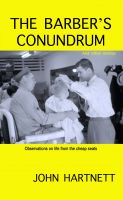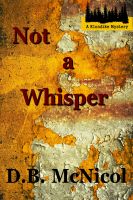Chapter 1
I’m writing
this in dark-blue ink, sitting by the wall where my shadow
moves. It crawls
like the hand on a numberless sundial, keeping track of time
that only I can
follow. My days are scheduled right down to the hour, to the
very minute, and
yet I’m not in a hurry. The shadow changes ever so slowly,
gradually blurring
and fading toward the fringes.
The
treatments have just been completed, and Sara has left my room.
That’s not her
real name; she borrowed it from some porn star. All our nurses
have such names
by choice, taken from forgotten DVDs left behind in patients’
chambers. This is
their favorite game; there’s also Esther, Laura, Veronica. None
of them has had
sex with me yet.
Sara is
usually cheerful and giggly. Just today I told her a joke about
a parrot, and
she laughed so hard she almost cried. She has olive skin, full
lips, and a pink
tongue. And she has breast implants that she’s really proud of.
They are large
and hard – at least that’s how they seem. Her body probably
promises more than
it can give.
Nevertheless,
I like Sara, though not as much as Veronica. Veronica was born
in Rio; her
narrow hips remind me of samba; her gaze pierces deep inside.
She has knees
that emanate immodesty. And she has long, thin, strong fingers…
I imagine them
to be very skillful. I like to fix my eyes on her with a squint,
but her look
is omniscient – it is impossible to confuse Veronica. I think
she is overly
cold toward me.
She doesn’t
use perfume, and sometimes I can detect her natural scent. It is
very faint,
almost imperceptible, but it penetrates as deeply as her gaze.
Then it seems
all the objects in the room smell of her – and the sheets, and
even my
clothing. And I regret I’m no longer that young – I could spend
hours in dreamy
masturbation, scanning the air with my sensitive nostrils. But
to do that now
would be somewhat awkward.
Anyway,
Esther arouses me even more than Veronica, perhaps because she
is “bi,” as Sara
once confided to me. Esther moves like a panther and looks like
an expensive
whore. Her nipples burn like hot coals, even through her
starched white blouse.
Her hair shimmers purple black, and her skin is tender like
silk, though it
looks more like velvet. The moment she comes close I seethe with
the desire to
touch her. I’ve done so a few times and even apparently got
somewhere – she
once slapped me in response. Surely it was a game, but I doubt
we’ll go much
further. Here’s why: now I like Laura from Santo Domingo best of
all.
Yesterday,
on her evening rounds, she was really hot. Yes, her legs are not
so slender and
her butt looks too large and heavy, but her whole body radiates
passion, a
natural lust too difficult to conceal. Cats scatter when they
hear her walking,
and gawkers turn their heads to stare. Even paralytics and
defunct oldsters get
horny when they feel her vibes – and I’m no paralytic or by any
means too old.
She leaned over me as if to arrange the sheet, flashed her huge
brown eyes, licked
her lips – and I knew I would have her now or very soon. I ran
the palm of my
hand up her thigh to the narrow moist strip of her thong. And
I’m not even sure
she was wearing a thong!
Then she
teased me with her slim bare foot, gazing at my face with a
come-hither look.
Too bad she had to leave so quickly – but this is just the
beginning, no doubt!
I whispered
after her, “Where are you going?” when she reached the door.
“Wait,” I
murmured. “Now I won’t be able to fall asleep.”
“Yes, you
will,” Laura assured me. “I gave you a good sedative.” Then she
added, “Think
of me!” And these words held a lot of promise.
I did think
about her, and then, in my dream I copulated wildly with a busty
mulata.
She smelled like Laura – the rainforest, the sea, the sweetest
of sour smokes.
Likely, from now on I’ll need this mix like a junkie.
It’s two
days until Laura’s next shift. Two long days of eager
anticipation. I now have
another goal for myself.
Thinking
about this, I face the window and view the distant mountains.
The sun has moved
down to the side. Turning my head, I see my shadow again; it’s
the only thing
marring the perfectly white wall. Soon the sun will shift
farther to the south,
and the wall will regain pure whiteness, announcing lunchtime.
Then the
mountains will change as their colors fade, the contours sharpen
and stand out
against the sky. The peaks will loom jagged; indifferent and
cold. A guard will
bring me the newspapers, and I will leaf through them vacantly,
scanning the
pictures and trying not to get newsprint on my fingers.
Then I’ll do
the usual set: some hatha poses, stretching my back and
leg muscles; a
tantra workout, keeping my balance with my eyes closed; and
finally, bandha
yama drills so my erection would be harder than a steel
spring. I’ll think
about Laura – already calling her “Lora” in the northern style.
She’ll like
that; it may bring us closer. Or, perhaps, we’ll even choose a
new name for
her.
The peaks
will finally grow indistinct in the twilight. Everything will
fall silent as
dusk turns to night. I’ll draw the curtains, leaving only a
crack so the fresh
air from the mountains filters into the room. Then I’ll have
dinner, drink a
half bottle of wine, and begin to compose another letter to
Semmant…
Listen! My
confinement might last years and years, but I’ll give it to you
straight: I am
not afraid and have nothing to hide. Let them think I’ve lost my
mind, but I
know, if anyone has – it’s not me! I’ll tell them something else
too: don’t
count on it. I’ll say, “Semmant!” It will be like a shout, and
yet the softest,
the most quiet of words. Only the quietest words work for
confessions –
confessions of hatred, and even more so, of love.
The white
walls surround me for a reason, but I will not crack up here,
and he – he is my
protector, my healer. Yes, at times I may lose control, and it
would seem I’ve
exhausted my strength, but I won’t succumb – as I can’t betray
him, cannot
leave him alone. Neither Esther nor Laura can help me in this –
and not Sara,
not Veronica. Their minds are somewhere else, I’m on my own, and
I’m not that
mighty. Take these notes – they reveal my weakness. But it’s
still no excuse to
abandon them.
I don’t look
for excuses – even here, behind these walls, despite the
treatments and the
constant spying. Oh, I know, very attentive eyes are keeping
watch over my
writing. I feel them with my back, my skin, and even with my
shadow on the
wall. But I don’t care; I pay them no heed. I am not posturing
or putting on an
act. I could simply discard the paper – ball it up, chuck it
aside. Even burn
it – or I could keep quiet and just stare out at the mountains,
which are
impervious to any words. But I can’t do it; I have to write,
even though it’s
so unbearably difficult to get through. It’s so hard to be heard
by others who
are lost in broad daylight, who are blinded by their inability
to see, who
suffocate in their own waste. They are all arrogant and
infinitely naïve. And
me – I’m not so different. I, too, am blind and naïve, and
arrogant in my own
way. That’s why we speak the same language, saying almost the
same thing.
So, day in
and day out, watchful eyes see a familiar picture. The papers
are scattered
across my table; it’s night, darkness, dead silence. I write to
him; then I get
distracted and write to all of you. My fingers grow numb; at
times I shiver
with cold. Then the opposite: I’m drenched in sweat – and
compose with
delirious haste, or sometimes a mere word per hour.
It takes
enormous effort, though the story is flawless, its plot coherent
and logical. I
drew it up myself, right up to the final scene; I started with
nothing and
ended up with more than I could possibly handle. It’s a great
experience, no
matter what; it would be foolish to keep it to myself. You may
object and laugh
behind my back, but I have an answer: I’ll say, “Semmant!” This
may raise
anger, provoke envy. But time will pass, and you’ll see that I’m
right.
He will not
become anybody’s hero – he’s not a hero at all. He is not a
conqueror, though
he knows no fear. You may be tempted to laugh at him as well –
yes, his naivety
surpasses mine, and yet oddly enough he is wise and discreet. No
one’s mockery
can change that.
It’s not
easy to become his friend. And who would dream of competing with
him, feeling
overconfident for no reason? Who would dare to take his place?
That would be
reckless and dangerous. His armor shines with a genuine gleam
and yet it cannot
save him from any arrow. Yes, one should not expect too much
from his shield.
And then, I realize, it’s more important for everyone to know:
what lies
beneath that shield?
I could give
a concise answer, but I’ll put it differently: shed your own
layers one by one.
Shed your clothing, your masks. Wash off the makeup. Take a
long, hard look at
what you see – can you make sense of it? Do this alone, since
it’s
embarrassing, indeed. The covers have been thrown on the floor,
and the labels
have even been cut out of them. All that remains is to look
deeper inside,
brushing away small details, with or without regret. The trick
is to get down
to what’s most vital, even if it’s concealed and hidden, locked
away. One may
grow tired and miserable along the way; and once there, may be
left speechless.
The unexpected may be found – some strange, unfamiliar things.
Who will be able
to name them properly? I guess no one, as is always the case.
Everybody will be
looking around: where is the hint, the subtlest of signs? And
then again I’ll
say, “Semmant.”
Listen – I
admit my idea was different. I had a less ambitious plan.
Everything was
supposed to turn out simpler. Some may even blame me: I was
following the
footsteps of evil. And yes, I relied on the blindness of the
crowd. I indulged
others’ greed, but my intentions were pure; they were good. At
least I was
unselfish; perhaps that vindicates me somehow, though I seek no
vindication
whatsoever.
I don’t seek
it because I feel no guilt; I’m even proud of myself, pleased. I
might have
done many things wrong, but now I know where I erred. I
recognize the most
horrible delusion, which could confound anybody.
Others can
learn it too, if they have the patience to hear me out. Which is
not likely.
But I continue.
Because the
only thing that matters is to keep moving forward.
Genre – Literary Fiction
Rating – NC17









